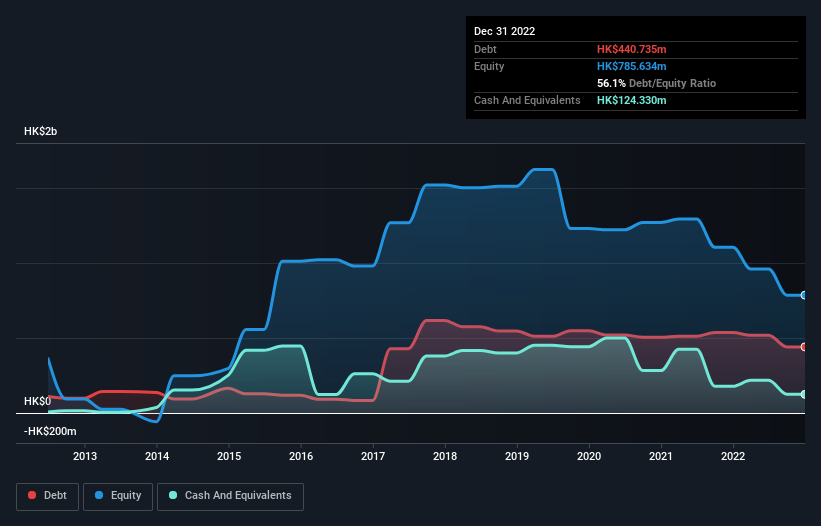- Hong Kong
- /
- Retail Distributors
- /
- SEHK:39
Is China Beidahuang Industry Group Holdings (HKG:39) A Risky Investment?

Legendary fund manager Li Lu (who Charlie Munger backed) once said, 'The biggest investment risk is not the volatility of prices, but whether you will suffer a permanent loss of capital.' So it might be obvious that you need to consider debt, when you think about how risky any given stock is, because too much debt can sink a company. We can see that China Beidahuang Industry Group Holdings Limited (HKG:39) does use debt in its business. But the more important question is: how much risk is that debt creating?
When Is Debt Dangerous?
Debt and other liabilities become risky for a business when it cannot easily fulfill those obligations, either with free cash flow or by raising capital at an attractive price. Ultimately, if the company can't fulfill its legal obligations to repay debt, shareholders could walk away with nothing. While that is not too common, we often do see indebted companies permanently diluting shareholders because lenders force them to raise capital at a distressed price. Of course, debt can be an important tool in businesses, particularly capital heavy businesses. When we think about a company's use of debt, we first look at cash and debt together.
View our latest analysis for China Beidahuang Industry Group Holdings
How Much Debt Does China Beidahuang Industry Group Holdings Carry?
You can click the graphic below for the historical numbers, but it shows that China Beidahuang Industry Group Holdings had HK$440.7m of debt in December 2022, down from HK$535.9m, one year before. On the flip side, it has HK$124.3m in cash leading to net debt of about HK$316.4m.

How Strong Is China Beidahuang Industry Group Holdings' Balance Sheet?
According to the last reported balance sheet, China Beidahuang Industry Group Holdings had liabilities of HK$1.02b due within 12 months, and liabilities of HK$136.9m due beyond 12 months. Offsetting this, it had HK$124.3m in cash and HK$344.9m in receivables that were due within 12 months. So it has liabilities totalling HK$690.1m more than its cash and near-term receivables, combined.
This is a mountain of leverage relative to its market capitalization of HK$1.11b. Should its lenders demand that it shore up the balance sheet, shareholders would likely face severe dilution.
We measure a company's debt load relative to its earnings power by looking at its net debt divided by its earnings before interest, tax, depreciation, and amortization (EBITDA) and by calculating how easily its earnings before interest and tax (EBIT) cover its interest expense (interest cover). This way, we consider both the absolute quantum of the debt, as well as the interest rates paid on it.
China Beidahuang Industry Group Holdings shareholders face the double whammy of a high net debt to EBITDA ratio (9.0), and fairly weak interest coverage, since EBIT is just 0.16 times the interest expense. This means we'd consider it to have a heavy debt load. However, the silver lining was that China Beidahuang Industry Group Holdings achieved a positive EBIT of HK$23m in the last twelve months, an improvement on the prior year's loss. There's no doubt that we learn most about debt from the balance sheet. But it is China Beidahuang Industry Group Holdings's earnings that will influence how the balance sheet holds up in the future. So when considering debt, it's definitely worth looking at the earnings trend. Click here for an interactive snapshot.
Finally, a business needs free cash flow to pay off debt; accounting profits just don't cut it. So it's worth checking how much of the earnings before interest and tax (EBIT) is backed by free cash flow. Happily for any shareholders, China Beidahuang Industry Group Holdings actually produced more free cash flow than EBIT over the last year. That sort of strong cash conversion gets us as excited as the crowd when the beat drops at a Daft Punk concert.
Our View
Neither China Beidahuang Industry Group Holdings's ability to cover its interest expense with its EBIT nor its net debt to EBITDA gave us confidence in its ability to take on more debt. But the good news is it seems to be able to convert EBIT to free cash flow with ease. Looking at all the angles mentioned above, it does seem to us that China Beidahuang Industry Group Holdings is a somewhat risky investment as a result of its debt. Not all risk is bad, as it can boost share price returns if it pays off, but this debt risk is worth keeping in mind. When analysing debt levels, the balance sheet is the obvious place to start. But ultimately, every company can contain risks that exist outside of the balance sheet. For example - China Beidahuang Industry Group Holdings has 1 warning sign we think you should be aware of.
At the end of the day, it's often better to focus on companies that are free from net debt. You can access our special list of such companies (all with a track record of profit growth). It's free.
New: AI Stock Screener & Alerts
Our new AI Stock Screener scans the market every day to uncover opportunities.
• Dividend Powerhouses (3%+ Yield)
• Undervalued Small Caps with Insider Buying
• High growth Tech and AI Companies
Or build your own from over 50 metrics.
Have feedback on this article? Concerned about the content? Get in touch with us directly. Alternatively, email editorial-team (at) simplywallst.com.
This article by Simply Wall St is general in nature. We provide commentary based on historical data and analyst forecasts only using an unbiased methodology and our articles are not intended to be financial advice. It does not constitute a recommendation to buy or sell any stock, and does not take account of your objectives, or your financial situation. We aim to bring you long-term focused analysis driven by fundamental data. Note that our analysis may not factor in the latest price-sensitive company announcements or qualitative material. Simply Wall St has no position in any stocks mentioned.
About SEHK:39
China Beidahuang Industry Group Holdings
An investment holding company, engages in the wine and liquor, food products trading, construction and development, rental, financial leasing, and mineral products businesses in the People’s Republic of China and Hong Kong.
Fair value with mediocre balance sheet.
Market Insights
Community Narratives



